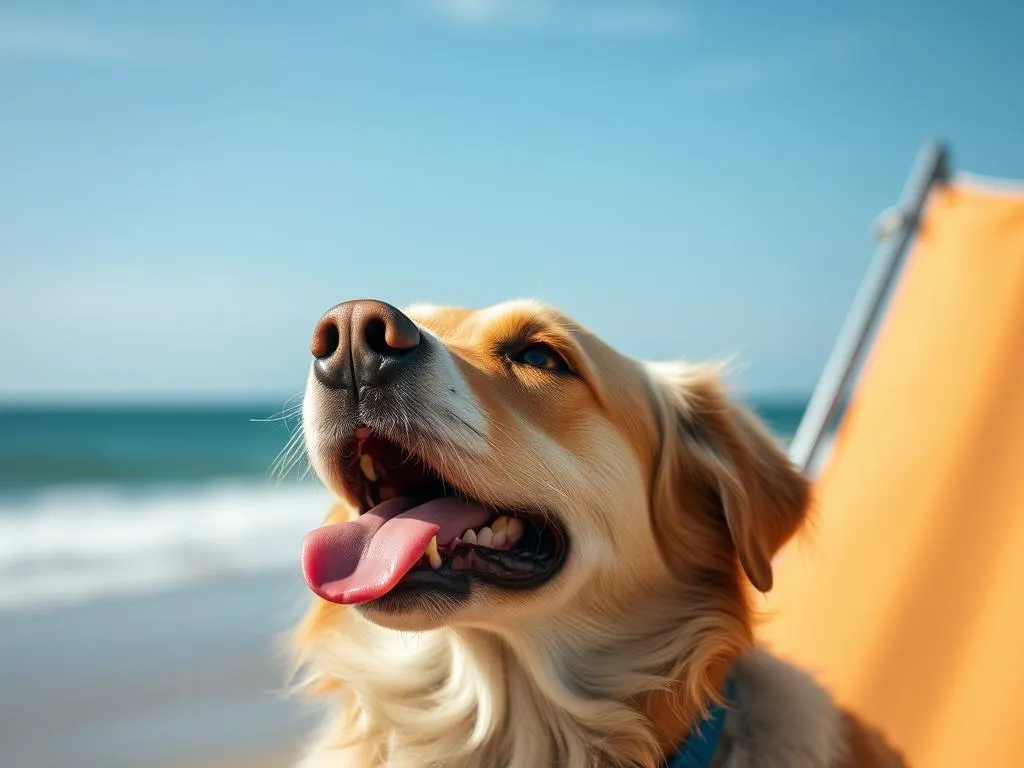
Introduction
As pet owners, ensuring the safety and well-being of our furry friends is a top priority. With many household products posing potential risks, it’s crucial to stay informed about what can harm our pets. One common concern that arises, especially during the summer months, is the ingestion of sunscreen by dogs. If you’ve found yourself asking, my dog ate sunscreen, what should I do, this article is designed to guide you through the necessary steps to take.
Sunscreens, while essential for protecting our skin from harmful UV rays, often contain ingredients that can be toxic to dogs. Understanding these ingredients and their potential effects is crucial for any pet owner. It is also vital to consult a veterinarian in any situation involving ingestion of harmful substances, as they can provide professional advice tailored to your dog’s needs.
Understanding Sunscreen and Its Ingredients
Common Ingredients in Sunscreens
Sunscreens generally fall into two categories: chemical and physical.
- Chemical sunscreens work by absorbing UV radiation through their chemical ingredients, such as avobenzone, octinoxate, and octocrylene.
- Physical sunscreens, on the other hand, contain active mineral ingredients like zinc oxide and titanium dioxide, which sit on the skin’s surface and reflect UV rays.
While both types are effective for human use, certain ingredients—especially those found in chemical formulas—can be harmful or even toxic to dogs.
Toxic Ingredients
Some common sunscreen ingredients that can be particularly dangerous for dogs include:
– Zinc Oxide: Can cause gastrointestinal upset and, in severe cases, lead to anemia.
– Octocrylene: May cause skin reactions and gastrointestinal issues.
– Parabens: While primarily used as preservatives, they can disrupt hormonal balance in pets.
Understanding these ingredients is crucial for any dog owner, especially as dogs tend to explore their environment with their mouths, increasing the risk of accidental ingestion.
Why Sunscreen is Dangerous for Dogs
The ingestion of sunscreen can lead to a variety of health issues for dogs. Potential reactions can range from mild gastrointestinal distress to severe neurological symptoms, depending on the amount consumed and the specific ingredients involved.
Potential Reactions
When a dog ingests sunscreen, they may experience:
– Gastrointestinal Distress: This can include vomiting, diarrhea, or loss of appetite.
– Skin Reactions: Rashes or irritation may develop, especially if the sunscreen is applied externally and licked off.
Symptoms of Ingestion
If your dog has ingested sunscreen, it’s essential to look for symptoms such as:
– Vomiting
– Diarrhea
– Excessive drooling
– Lethargy
– Signs of discomfort or pain
If you notice any of these symptoms, it’s crucial to seek veterinary advice as soon as possible.
Immediate Steps to Take If Your Dog Eats Sunscreen
Assessing the Situation
The first step you should take if you suspect your dog has ingested sunscreen is to assess the situation carefully.
Identify the Type of Sunscreen
Knowing the brand and the specific ingredients in the sunscreen can significantly help your veterinarian determine the best course of action. Take a moment to check the label and note any potentially harmful ingredients.
Determine Amount Ingested
Try to estimate how much sunscreen your dog may have ingested. This information is crucial for your vet and can influence their treatment recommendations.
Contacting a Veterinarian
After assessing the situation, the next step is to contact your veterinarian.
When to Call the Vet
You should call the vet if your dog shows any signs of distress or if you know they have ingested a significant amount of sunscreen. Symptoms that require immediate veterinary attention include:
– Persistent vomiting
– Difficulty breathing
– Seizures or tremors
Information to Provide
When you call the vet, be prepared to provide the following information:
– Your dog’s weight
– The type of sunscreen ingested
– The estimated amount consumed
– Any symptoms your dog is showing
This information will help the veterinarian assess the severity of the situation and determine the appropriate next steps.
First Aid Measures
While waiting for veterinary advice, there are some first aid measures you can consider.
Do’s and Don’ts
- Do: Keep your dog calm and monitor their symptoms.
- Do: Take note of the sunscreen ingredients and the amount ingested.
- Don’t: Induce vomiting unless explicitly instructed by a veterinarian, as this can sometimes worsen the situation.
Inducing Vomiting
Inducing vomiting might be appropriate in some cases, but only under veterinary guidance. If your veterinarian advises you to induce vomiting, they may recommend using hydrogen peroxide. However, it’s essential to follow their instructions carefully to ensure your dog’s safety.
Potential Symptoms to Monitor
Mild Symptoms
If your dog has ingested sunscreen, keep an eye on them for mild symptoms, which may include:
- Gastrointestinal Distress: Signs such as vomiting or diarrhea may occur. Monitor your dog’s eating habits and hydration levels.
- Skin Reactions: Watch for any rashes or irritations, especially if they’ve licked the sunscreen off their fur.
Severe Symptoms
If you notice any severe symptoms, seek immediate veterinary care. These may include:
- Neurological Signs: Tremors, seizures, or disorientation can indicate a serious reaction.
- Respiratory Distress: Difficulty breathing or excessive coughing is a sign of potential airway blockage or toxicity.
Long-term Effects
Ingesting sunscreen can lead to potential long-term health issues, particularly if toxic ingredients are involved. Some complications may include:
– Anemia: Particularly from zinc oxide ingestion.
– Organ Damage: If the sunscreen contains harmful chemicals that affect the liver or kidneys.
Follow-Up Care
After a potential ingestion incident, it’s essential to follow up with your veterinarian. They may recommend additional tests or monitoring to ensure your dog’s health is not compromised.
Prevention Tips for Pet Owners
Safe Storage Practices
Preventing sunscreen ingestion starts with safe storage practices.
Where to Store Sunscreen
Store all sunscreens out of reach of pets. A high shelf or a locked cabinet is ideal to ensure that your dog cannot access these products.
Labeling and Awareness
Always read product labels carefully. Familiarize yourself with the ingredients and their potential risks to pets. Being aware of what’s in your household products can help you make informed decisions.
Dog-Friendly Alternatives
Fortunately, there are pet-safe sunscreens available on the market. When considering sunscreen for your dog, look for products specifically formulated for pets.
Pet-Safe Sunscreens
Some brands offer dog-safe sunscreens that do not contain harmful ingredients. Always opt for these when planning outdoor activities with your pet.
Other Protective Measures
In addition to sunscreen, consider other protective measures like:
– Dog Clothing: Lightweight, protective clothing can help shield your dog from UV rays.
– Shade: Provide plenty of shaded areas for your dog to relax during sunny days.
Frequently Asked Questions (FAQs)
Can all sunscreens be harmful to dogs?
Not all sunscreens are created equal. Some human sunscreens contain toxic ingredients that can be harmful to dogs. Always check the label and opt for pet-safe products whenever possible.
What if my dog shows no symptoms after eating sunscreen?
Even if your dog shows no immediate symptoms, it’s still advisable to contact your veterinarian. Some reactions may take time to manifest, and your vet can provide guidance based on the specific product ingested.
How can I prevent my dog from getting into sunscreen again?
Preventing future incidents involves safe storage and education. Keep sunscreens out of reach and ensure all family members are aware of the dangers of leaving products accessible to pets.
Are there any home remedies for sunscreen ingestion?
Home remedies are not recommended for sunscreen ingestion. Always consult your veterinarian for appropriate treatment and advice based on the specific situation.
Conclusion
In summary, if you find yourself in the situation of asking, my dog ate sunscreen, what should I do, remember to assess the situation carefully, contact your veterinarian, and monitor your dog’s symptoms. Understanding the risks associated with sunscreen ingestion and taking preventive measures can help keep your pet safe. Always prioritize your dog’s health by consulting a veterinarian for any concerns, and stay vigilant about the products you keep in your home. Pet safety should always be a top priority, and being informed is the first step in ensuring a healthy and happy environment for your furry friends.









